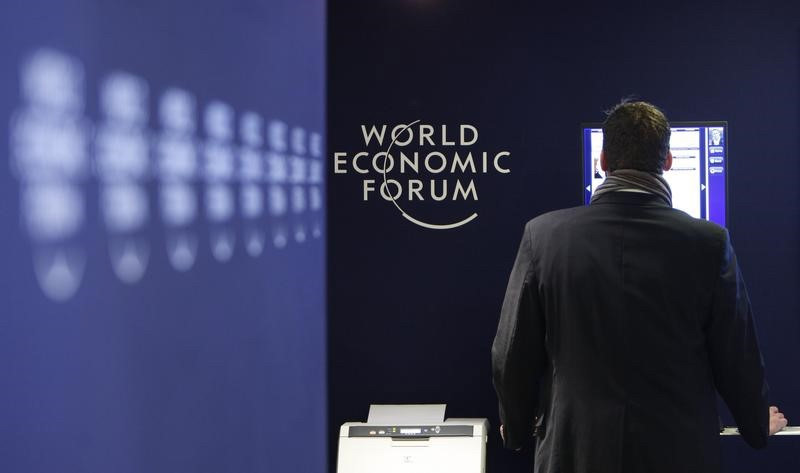London, UK
Thomson Reuters Foundation
The World Economic Forum’s gathering of global political and business elites in Davos, Switzerland took place online this year because of COVID-19 and was covered less avidly than usual by the media.
But, through its digital platform, the forum’s organisers laid out an agenda more ambitious than usual, invoking the need for a “great reset” around the world in the wake of the pandemic.

A man stands at a computer terminal at the World Economic Forum (WEF) in Davos on 29th January, 2010. PICTURE: Reuters/Christian Hartmann/File photo.
What does the reset look like? Here are key talking points you may have missed:
Billionaires benefit
The economic toll of the coronavirus pandemic lent a new urgency to this year’s WEF conference.
At least 225 million jobs vanished worldwide over the past year – losses that were four times larger than those endured in the 2008 global financial crisis – according to a report published Monday by the International Labor Organization.
Oxfam, the anti-poverty non-profit, separately found that while the world’s 1,000 richest people recouped their losses during the pandemic in a matter of months, it could take more than a decade for the world’s poorest to recover from its economic impact.
Vaccine nationalism
Faced with these dire conclusions, world leaders at WEF, at least rhetorically, rose to the occasion.
French President Emmanuel Macron declared Tuesday that “we will get out of this pandemic only with an economy that thinks more about fighting inequalities”.
South African President Cyril Ramaphosa spoke about the dangers of “vaccine nationalism”, scolding leaders of wealthy countries for insisting Covid-19 is a global virus while simultaneously hogging vaccines for their own use.
Jordan’s King Abdullah told world leaders they had a “global responsibility” to safeguard the health of refugees from COVID-19, after his country became one of the first to vaccinate refugees.
China’s Xi Jinping said that Beijing would help countries and regions less prepared to cope with the pandemic, and ensure vaccines were available in developing countries.
Doubts about Davos
Of course, reasons for scepticism abound over the utility of elite gatherings like WEF.
In the United States, the controversy over the GameSpot stock, involving amateur retail investors who organised online to disrupt the schemes of hedge funds, is an example of populist scorn held by many for the type of institutional investors who attend Davos each year.
Meanwhile, youth activists from around the world projected an alternative Davos message onto the conference center where the WEF usually takes place.
The projection featured young people from Kenya, the Philippines, the UK, and Mexico rejecting the Davos script and replacing it with their solutions to inequality.
Swedish activist Greta Thunberg also made an appearance at Davos with an impassioned speech about climate change.
“We understand that the world is complex and that change doesn’t happen overnight, but you’ve now had more than three decades of blah, blah, blah – how many more do you need? Because when it comes to facing the climate emergency, the world is still in a state of complete denial.”
Big tech regulation
European Commission President, Ursula von der Leyen, warned against the “immense power” of tech companies on democracies and called for more regulation that go beyond company policies.
“The business model of online platforms has an impact – and not only on free and fair competition, but also on our democracies, our security and on the quality of our information,” she said.
Russian President Vladimir Putin also took aim at tech companies at Davos, and accused them of “substituting legitimate democratic institutions”.
Russia earlier this month asked social networks, including video-sharing app TikTok, to stop the spread of posts encouraging minors to take part in unsanctioned rallies in support of jailed Kremlin critic Alexei Navalny.
Make AI more ethical
From reducing bias in product design to tackling racial injustice, more than 100 businesses, governments and nonprofits launched a global initiative to make artificial intelligence more ethical and transparent.
The Global AI Action Alliance will identify tools and best practices to safely and ethically use AI, which is projected to contribute more than $US14 trillion to the global economy by 2035.
Transforming Food Systems and Land Use
More than one billion tonnes of food are wasted every year and agriculture remains a major driver of water use, climate change and nature loss. A nature-positive economy could create 395 million new jobs by 2030. With the Biodiversity COP15 and the UN Food Systems Summit scheduled for 2021.
COVID-19 disrupted an already vulnerable food supply chain, said panelists, leaving some 270 million people on the brink of starvation and two billion without safe, nutritious food.
David Beasley, executive director of the United Nations World Food Programme, said the private sector must help roll out innovations to more farmers and transform a food system that will have to feed 10 billion people by 2050.






